2022.03.09
COVID-19 changed my career plan after graduating from university. To a new world from a graduate school in the UK
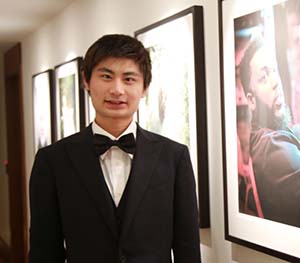
- Kazuma Shimizu
- The University of Edinburgh
Edinburgh College of Art, MSc Urban Strategies and Design
Graduated in March 2021 from the Department of English Studies, Division of Humanities and Social Sciences, the Faculty of Letters
After graduating from Chuo University in September 2021, I have been studying as a graduate student at the University of Edinburgh, Scotland, UK. My decision to go on to graduate school in the UK was mostly due to the global pandemic of COVID-19.
Before COVID-19, I was aiming to become an air traffic controller after graduation, so I attended information sessions and engaged in long-term internships and job search activities to work in Japan, including airline-related companies. However, because the airline industry was hit hard by COVID-19, I was forced to reconsider my plans. When I had no idea of my life goal that was directed toward society and someone, I received advice from many people, including my boss at my part-time job, and I took another look at what I wanted to do.
Then, I started thinking about living and working in a country of my interest, rather than travelling or studying abroad. After looking into various travel options, I thought that the best option would be to get a degree at a local university first and become familiar with the culture and atmosphere of the country, and then find a job at a local company through job search activities.
Choosing a graduate school - Life at Graduate School in the UK
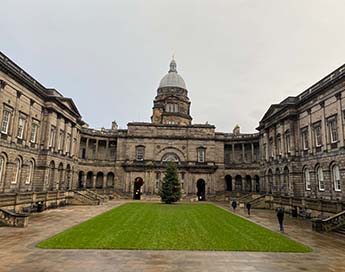
Old College, University of Edinburgh
Choosing a graduate school - Life at Graduate School in the UK
●Choosing a country and graduate school to study
First, I chose a country to study. Singapore, where I had experienced studying before, was an option, but I wanted to try a Western country. I had been to major English-speaking countries during my university days, so I thought that the UK would be the best considering my local friends, network of personal connections, and culture.
The UK was also attractive to me because the graduate admissions process is less complicated than in the USA and Canada, as well as the master’s degree is completed in one year, which reduces my necessary costs. In addition, under the revised visa rules, the Graduate Route Visa was launched, which allows students who have completed a degree at the undergraduate level in the UK to work or look for work for two years after graduation. I often hear that a work-related visa is the biggest hurdle of working and living abroad, so this was a quite important deciding factor for me as I was going to the UK with a future career in mind.
Next, the four factors I focused on when choosing a graduate school were: the research environment, the cost, the city where the university is located, and the views of local people toward foreigners. As to the research environment, I wanted to deepen my research at a higher level. Secondly, considering the cost, I couldn’t afford very prestigious universities (as well as my proficiency). Another major factor was that I wanted to go to an area with history and beautiful cityscapes. In Edinburgh, where I live now, the entire city is a World Heritage Site: the Old Town, built in the 14th century, and the New Town, built in the 18th century, and just walking around the city makes me excited. Finally, I put a lot of emphasis on tolerance toward foreigners. This is because when I once experienced discrimination against Asian people in a foreign country which made me afraid of communicating with others. After such an experience, I chose an area that was as tolerant as possible toward foreigners.
Then, out of 14 departments in 13 universities that I applied to and was accepted into, I entered the University of Edinburgh, which I was most satisfied with. Based on the facts that the University of Edinburgh was more tolerant of students who had not studied a related field at the undergraduate level; I had more interest in the professors’ specialized fields; the University ranked high in the academic rankings; and I received an acceptance letter very early, finally I decided to go to the University of Edinburgh. From my choice of a school to the actual application process, I received support from many people, including professors at Chuo. In particular, Daisuke, my senior in the business English course in my first year, gave me kind advice and support, not only about English and studying abroad but also my career path generally, as if he were my big brother.
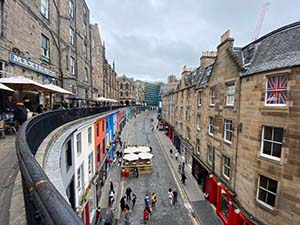
Colourful shops on Victoria Street
●Graduate school life at the University of Edinburgh
Now I am studying urban planning in the Urban Strategies and Design Programme at Edinburgh College of Art, University of Edinburgh. There are two master’s programmes in the UK: Research Masters and Taught Masters. The former is mainly a research programme, and the latter is kind of an extension of the undergraduate programme, taking classes in the first and second semesters and writing a master’s thesis in the third semester. As I am a Taught Master, my graduate school life is not a research lifestyle. I study in depth the sustainable urban transport systems as well as the health and well-being of people. In addition, my classes cover topics related to housing and designing disaster-resilient communities. I am preparing my Master’s thesis and will be investigating shared mobility, such as bike sharing, using geographical and statistical analysis.
This is a different field from linguistics, which I majored in during my undergraduate years at Chuo, but there are three reasons why I ended up here. First, when I studied at Nanyang Technological University in Singapore, I decided to take classes in a field close to science since I was at a “science and technology university,” I took a class which studies on natural disasters and how society adapts to them. I took it lightly, but it was surprisingly interesting and I thought that one day I would like to study a related field. Secondly, the International Cooperation Program of the Faculty Linkage Program (FLP), where I studied and researched “sustainability” in my second year and “how migrants integrate into new societies and the issues they have” in my third and fourth years. Both of the themes, “sustainability” and “immigration” are essential elements in urban development. Thirdly, I wanted to study something related to the air traffic controller profession, which I gave up during my undergraduate days. In terms of transport infrastructure, airports are more or less a topic in class, so I think at least there is a compatibility between them.
Although this is my first time studying abroad as a full-time student, I had the great advantage of the experience that I had stayed in a foreign country with a long-term student exchange program in my undergraduate years. In terms of academics in particular, I haven’t had any difficulty so far as I have managed to overcome my bitter experience in Singapore, where I was not able to keep up with discussions in the class, which Japanese people are especially weak at, and had to run away and cry in the toilet.
However, keeping up with both study and extracurricular activities is a challenge. Now I work as a Residence Assistant (RA) in the student dormitory, where I am mainly responsible for assisting students with their residence life, office hours, and organising and attracting residents to events in the dormitory. Besides, in the first semester, I did an internship helping in social media management while I was looking for a job after graduation.
Studying for a master’s degree requires a lot of energy. Since I didn’t study a related field at the undergraduate level, I have to supplement my knowledge and usually spend five or six hours at my desk, and ten to 11 hours before submitting assignments.
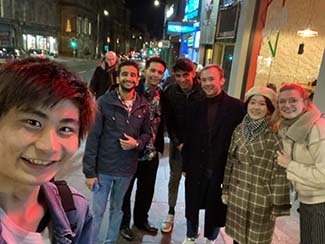
My flatmates
●Scottish English, languages and cultural differences
My master’s programme is divided into three terms a year: theory-focused classes in the first term, practice-focused classes in the second term, and writing a master’s thesis in the third term. Because of COVID-19, the larger lectures and group discussion classes are online, while the smaller discussion-based classes are in a hybrid format with a choice of face-to-face or online. In group discussions, I often had difficulties listening to my classmates with strong Scottish accents but making use of what I learned in Singapore, I had practised listening to Scottish English on YouTube before studying abroad, so little by little I got used to it.
Even though I am enrolled in a master’s programme in the UK, 70% of my classmates are from China. I think it would be a good opportunity to develop new language skills and I feel my Chinese is improving!
In addition, now I belong to an activity group which is similar to a club activity in Japan. Besides Scottish, I interact with people from England, the USA, Russia, Germany, Greece, Egypt, Nigeria, Mexico, India, Pakistan, Thailand, Taiwan, Macau, and many more countries.
Students who gather at the same university probably have similar educational and socio-economic backgrounds, so I have hardly hit any big barriers in communal life or experienced any cultural differences superficially. It may be because one of the undergraduate courses, “British Culture,” helped me gain a deeper understanding of culture, classes, and politics. Through this course, I learned about the historical, political, and cultural reasons behind what we see, hear, and feel on the surface. This knowledge allowed me to perceive the invisible backgrounds. Among the four countries of the UK, in particular, Scotland has a unique culture and history that is strongly rooted in the country. I am glad that I came here after understanding these things.

Edinburgh Castle, the symbol of the World Heritage City
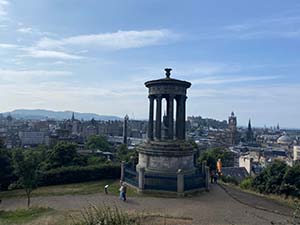
Carlton Hill in the New Town, Edinburgh
Attend the COP26 and Environmental Film Festival in fall 2021!
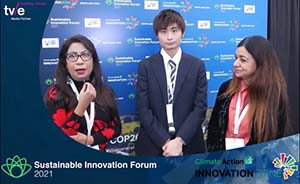
Being interviewed at COP26
After the start of my study abroad, I had an opportunity to attend the “COP26” and “tve Global Sustainability Film Awards 2021.” Both were realized thanks to the efforts of Chuo alumni in the UK.
●COP26 (United Nations Conference on Environment and Climate Change)
COP26, the United Nations Conference on Environment and Climate Change held in Glasgow, UK, in November 2021. As a young ambassador, I mainly listened to the forum and filmed interviews. There are three venues at COP26: the Blue Zone, where international agreements are made by government officials; the Green Zone, an exhibition open to the public; and the Innovation Zone, where companies, local authorities, and NGOs discuss environmental policies and issues they are working on. I attended a forum in the Innovation Zone. In the morning I listened to a panel discussion, and in the afternoon I told my views on environmental issues to a TV camera in an interview format.
As I am studying urban development in graduate school, topics such as environmental issues and sustainability have great relevance to me, so I was very inspired by this forum. I had a very useful time to realize how the academic theories I had learned were being reflected in companies and local authorities. During the Q&A session and lunchtime, I had great opportunities to talk with a business owner who runs a transport infrastructure business in Switzerland, and a local government in California, USA, which helped me network. It was like a dream come true to attend a UN event, listen to people at the forefront of the world in person, and share my views with the world. Although it was only for one day, it was a very meaningful event.
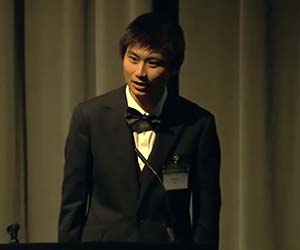
Speech at the film festival
●tve Global Sustainability Film Awards 2021
At the film festival, I went on stage during the awards ceremony to announce the winners and give a short speech. The film festival is an annual competition in which films on eight themes related to environmental protection are submitted to the public from all over the world. The awards ceremony for the selected films was held at a venue in Piccadilly Circus, London.
On the day, visitors were also able to experience behind-the-scenes operations and management of an international event, such as setting up the venue and directing visitors. I heard that the general admission fee was £200. With around 200 people gathered at the venue, being able to give a speech in such an environment gave me confidence and I am grateful to those who gave me such an opportunity.
Memories and learning in my university days. Encounters with my mentors
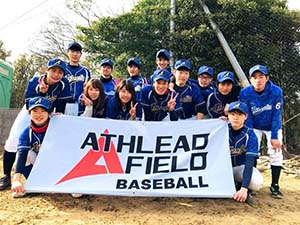
Participation in Chuo baseball club “Atlantis” first-year tournament
When I was a high school student, I wanted to become an English teacher and work with people around the world using foreign languages, so I entered the Department of English Studies in the Faculty of Letters, which offers a good environment to learn English and to obtain a teacher training certificate in English.
During my four years at university, I was full of curiosity and tried many things, such as English teacher training course, global studies and overseas training in the first year, baseball club, national university student presentation competition, one semester exchange program at Nanyang Technological University (Singapore), ESS (English club) officer, FLP international cooperation program (Takeishi seminar), overseas trips to 20 countries, and long-term internships. I also put a lot of effort into my undergraduate studies, and with the help of Professor Wakabayashi in my undergraduate seminar, I made a research presentation at an international conference.
If there was something I wanted to try, I always kept in mind what and when I should do, and got actively involved in things.
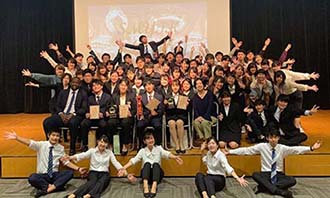
Chuo ESS speech contest I organized in my third year
I love languages as an academic subject and studied English and linguistics in my undergraduate seminar. I found it very interesting to think about the process of human language acquisition and the background of the language itself, such as grammar and vocabulary.
I also took some foreign language classes, such as French, Spanish, and Arabic. Furthermore, since I became interested in Chinese after studying in Singapore, I had Chinese lessons at the G-Square Language Lab. Now I manage to speak Spanish and Chinese. Learning a new language and being able to put my thoughts into words is the greatest joy of language learning, and it motivates me to improve my language skills.
Memories from my university days that greatly influenced myself
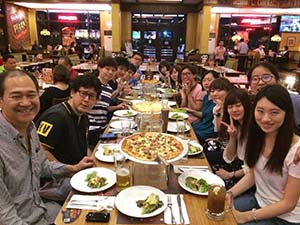
Training in the Philippines - Professor Nomiya and peers
●First year - Nomiya seminar training in the Philippines, which led to my pursuit of English and linguistics
I took the Nomiya seminar as a Global Studies student in my first year. In one week of activity in Manila, Philippines, with senior students of the seminar, I visited companies and organizations to conduct interviews. Listening to Filipino English, which is different from the way Japanese people speak as well as different from textbooks, I was surprised and at the same time intrigued to know the existence of English that is different from what I had always thought was correct. A local taxi driver told me that he is proud of the English he speaks. This experience motivated me to pursue English studies and linguistics in addition to learning English.
Professor Nomiya and Risa
I am grateful to Professor Daishiro Nomiya (Professor of the Faculty of Letters) for his help during my first year. He values independence, and while he had normally arranged for a Japanese language student at a local university to serve as an interpreter during the training, he gladly accepted my request to use English without an interpreter. I believe that it was because I took his seminar as a first-year student that I was able to acquire the ability to take action over the next three years that has led me to where I am today.
Risa was a senior student who supported the seminar. She kindly helped us not only with the seminar but also with study abroad counselling and study. In particular, I cannot thank her enough for calling me almost every day to help me practice speaking for the TOEFL test when I was preparing my application to study abroad in Singapore.
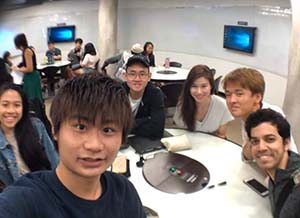
Nanyang Technological University, final class with my classmates
●Exchange program in Singapore (fall, 2nd year)
In my second year, I studied at Nanyang Technological University in Singapore as an exchange student for about five months from August to December. I was greatly influenced by the experience of living abroad, the expansion of my global network, and the way I think about my own country.
People often ask, “Why Singapore?” I have three reasons. First, Nanyang Technological University is a high-level academic institution among the partner institutions, and I wanted to put myself in such an environment to test myself. Second, my curiosity about English, which had grown during my training in the Philippines. I was interested in Singaporean English, which is so unique that it is called Singlish. Third, I was interested in cultural and linguistic diversity. Singapore is a multi-ethnic country, and in an island as small as the Tokyo 23 wards, there are people of Malay and Indian descent besides the majority of Chinese Singaporeans, and about 30% of the population are foreign nationals. There is a great variety of cultures and languages. I was interested in the culture including religion, architecture, and food culture, as well as Chinese and Malay languages.
It was my first time living away from my family, so I was nervous at first, but after a few weeks and getting used to life, daily activities, such as studying, eating, and doing laundry became surprisingly normal. I had a special perception about living abroad, but I realized that it was not as big as I had expected.
I also realized the importance of connections between people. In Singapore, you can share a common identity with everyone, so I didn’t have any trouble making friends. Singaporeans and I have one thing in common, “Asians.” 80% of international students at Nanyang Technological University are from Europe or Americas, such as the US, Germany, and the UK, and they have in common, “foreigners.” While studying abroad, having a common identity provided me with emotional support, and by making friends from all over the world, I felt like my world suddenly expanded. I still keep in touch with my roommate from Hong Kong regularly.
Furthermore, I learned a lot about my feelings and ways of thinking about my own country. When we surveyed in one class, there were questions about love for one’s country, such as “Proud to be a Singaporean” or “Do you like Singapore?” What surprised me was that most people answered “very proud” or “liked it very much.” Until now, I had never thought about whether I liked my country, and this made me think about my feelings towards my own country.
Singapore is a wonderful country, both culturally and economically developed and preserving tradition. I visited Singapore several times after my study abroad program and came to love the country very much, and hope to return someday. When I decided to study abroad in the UK, my experience in Singapore helped my new decision.
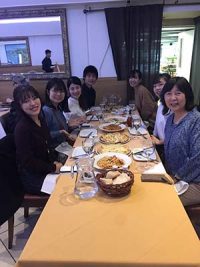
FLP Takeishi seminar in London
●Presentation at Harvard University (Takeishi seminar, FLP International Cooperation Program)
During the summer break of my third year, I had an opportunity to give a presentation at Harvard University as part of the Takeishi seminar, FLP International Cooperation Program. The purpose of the event was to read papers on the theme of “Adam Smith and Modern Society” and to express our thoughts. We spent several months preparing with the support of the seminar’s Professor Chikako Takeishi (Vice President and the Director of the Organization for Common Education Initiatives at Chuo).
I still remember when I arrived in Boston, Massachusetts, I was so nervous that I couldn’t even taste the food. Finishing my presentation in front of a professor at Harvard University, I received positive feedback from the professor. I gave a presentation at Harvard University, one of the world’s top universities, and received praise from the professor. This experience gave me confidence in my abilities and helped me decide to pursue graduate school in the UK.
Professor Takeishi
She has been helping me in the FLP International Cooperation Program since my second year. Through seminar activities such as research and presentations, she provided me with opportunities to meet many students and working adults in and outside of Japan. Through these experiences, I was able to learn about the basics of living in a society, such as how society works, what global means, and what happiness in life is. She pays attention to us and understands students. When I decided to go to graduate school, she wrote a letter of recommendation for my application, and each word had so much weight that it brought tears to my eyes when I read it. She gave me the strength to work harder and to do things my way.
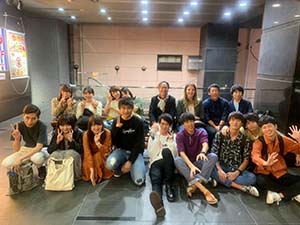
Wakabayashi seminar year-end party
●3rd year- Wakabayashi seminar taught me an interest in linguistics and the academic world
In the undergraduate seminar, with the guidance of Professor Shigenori Wakabayashi (Professor of the Faculty of Letters), I conducted research on linguistics, especially language acquisition. He was a professor who always encouraged students.
In my third year, I submitted my research on Japanese language acquisition to the screening of an international conference presentation. With the support of Professor Wakabayashi, I passed the screening. Although the presentation was held online due to COVID-19, I presented my research in front of scholars from Japan and abroad. It was not easy to answer their difficult questions logically after the presentation, but at the same time it was a very fulfilling time that I managed to make a presentation and have discussions, and I was attracted by the academic world. I am currently studying urban planning in graduate school, and although my major and academic field are different, this experience at the academic conference was also a big factor in my decision to go on to graduate school.
Professor Wakabayashi
I am grateful to him that he brought me into the academic world, including academic conferences. He gave me a lot of advice on my career path based on his experience. I received some harsh words at times, but they motivated me to become who I am today. On the other hand, during training camps and events, I was impressed to see him having more fun than any other student. I admired his strength of sharpness.
To Chuo students: what you need to be active in the world
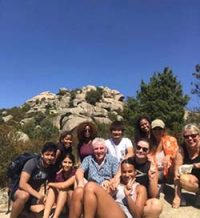
During my undergraduate years, I travelled to over 20 countries by myself. Hiking tour in Spain
●What you need to be active in the world
Many people may be worried about language skills when they leave Japan for activities. That is one important skill, but I think the mindset is even more important. If you find something interesting, whether you are working on a regional or global scale, I think it is important to do some research first. If you use the Internet, communicate with friends and family, or seek advice from people who have gone through similar experiences, you can learn about the path you need to take, the time it might take, the resources you need, and will be able to make a strategy. If you have the courage to make a decision, the energy to continue making the effort, and the excitement and motivation to pursue your goals, your chances of achieving success will significantly increase.
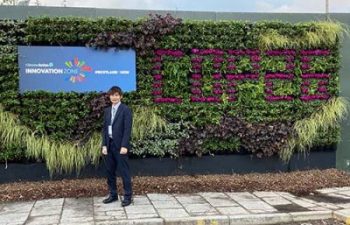
Commemorative photo at COP26
●Future plans
After job seeking in the UK, which I started before my departure, I received a job offer as a digital marketing assistant from a local IT company in London in early 2022. As a result, I was able to live in London in the UK, after graduating from university as per my goal. Based on my previous internship experience in a similar job and my vision that I would like to work in Singapore after London, I decided to enter this industry where I could use my digital marketing skills to work in the Asian economic hub. On the other hand, I don’t want to give up on my old dream yet, so I am considering waiting for aviation demand to recover and taking the air traffic controller exam. Without forgetting my gratitude to the people who supported me, I would like to continue to challenge myself in my favourite place, doing what I like, in my way.
●Message to Chuo students
I believe that life can change in any way you want. Through my experiences so far, I have realized that when there is something you want to do, what is important to make it come true is imagination, planning, and the ability to take action to carry it out.
My way of life is that “studying abroad or getting a job overseas is not that far away, so I will take on the challenges.” Even though I am a “truly Japanese” born and raised in Japan, I am trying to prove that it is true. No matter what it is, I think it is important to take a step forward if you are interested! Even if your path is different from those around you, by believing in yourself and creating a life that suits you, you may come across unexpected opportunities!
■Profile■
Kazuma Shimizu
Born in 1998 in Chiba Prefecture. Graduated from Chuo University High School. Graduated from the Department of English Studies, Division of Humanities and Social Sciences, the Faculty of Letters in March 2021
●Seminars attended during my studies
